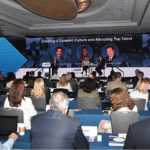
The official theme of the 101st Annual Convention of Destination Marketing Association International (DMAI) in Austin was “Leave the Path, Blaze a Trail,” but author and entrepreneur Josh Linkner offered an alternative during his opening keynote, sponsored by Convene. “Disrupt or be disrupted,” said Linkner, who cited his hometown, Detroit, as a destination in the midst of reinvention. “Even if your destination already has a story, it doesn’t mean you have to stick with it.”
DMAI itself has figured as much. A few years ago, as the organization prepared for its 100th anniversary, its leadership huddled for some serious soul searching. Between the sharing economy, shifting demographics, technology, and social media, the drivers of travel were rapidly changing. To meet those challenges, DMAI kicked off DestinationNEXT, an ambitious three-year study to give DMOs “practical, clear actions and strategies for sustainable success in a dramatically changing world.”
During DMAI 2015, held at the Austin Convention Center on July 15–17, DMAI unveiled part two of DestinationNEXT. “It’s a very exciting time to be in the industry, provided you capitalize on three transformational opportunities,” DestinationNEXT coauthor Paul Ouimet, executive vice president of InterVISTAS Consulting, said as he introduced the new findings. Those three opportunities: moving from broadcast to engagement (“which requires a fundamental mindset shift,” Ouimet said), playing a central role in product and economic development, and cementing partnerships between destination stakeholders to create the “authentic experiences” that both leisure and business travelers crave. In other words, according to Ouimet, “become a trailblazer.”
How do DMOs master disruptive forces? Phase two of DestinationNEXT offers an online self-diagnostic tool that helps DMOs figure out where they fall on the spectrum of reinvention.
Many speakers had their own ideas, too. “Use brains rather than marketing budget,” Greg Klassen, a veteran travel and tourism industry strategist and consultant, urged during a breakout session. Destinations tend to focus on “place rather than experience,” Klassen said, which is an outmoded way of thinking. Rather, he said, “the new roles of DMOs are as curators of experiences.”
The convention took place in a city that has plenty of “experiences,” from live music and food trucks to an explosion of hotels. As daytime temperatures flirted with 100 degrees, the 1,470 attendees migrated from a raucous musical welcome helmed by fiddler Alvin Crow to an opening party at Austin City Limits Live at the Moody Theater. Some attendees lingered at the sleek patio bar of the JW Marriott Austin, which opened downtown in February. During DMAI, Westin opened its first hotel in the city, the music-themed, 366-room Westin Austin Downtown Hotel, with a stunning rooftop pool and bar. And in 2017, the city will become home to the largest Fairmount hotel in the world, the 37-story, 1,068-room Fairmount Austin.
“As DMOs, we have a tremendous task in front of us every day,” Scott Beck, president and CEO of Visit Salt Lake and immediate past chair of the DMAI Board of Directors, said during the opening session. As the three days of the convention drew to a close, it looked like destination-marketing professionals were having a blast with that challenge.




